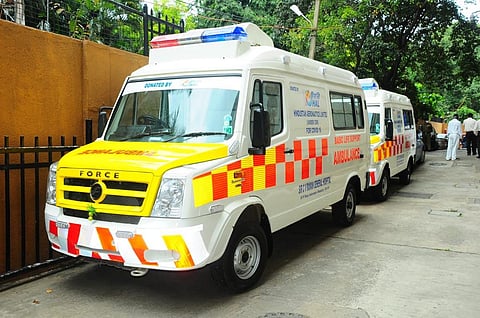

TIRUCHY: Wednesday was a tough day for 40-year-old Suresh, who works as an ambulance driver. While he had taken many Covid positive patients to hospital, he had to ferry his own aunt on the day. He says it was tough for him, as she had several co-morbidities and the past two weeks were the most challenging ones in his two-decade career.
Ambulance drivers and workers like Suresh have been working round the clock since the pandemic began. While they had an increased workload in the beginning, the cases in Tiruchy were mostly under control. The district, however, has been reporting more than 300 cases in the past two weeks with the number touching almost 500 on Wednesday.
Ambulance workers do what blood relatives are scared of – they physically help patients get on stretchers or wheelchairs if they are unable to walk, and transport them to hospitals. They work almost 10-12 hours every day.
“Cases are increasing and we, at times, have to ferry almost 10 patients to hospital at a time. These are challenging times for us. As we help patients, we have to maintain safe distance ourselves at home. It is very difficult to again be away from family and not play with my kids,” says Divagar, an ambulance worker.
The PPE challenge
“Sometimes, we have to travel 40-50 km to pick up patients, if the nearby ambulances are busy. There are ambulances for every 10 km, but the situation is such that Covid ambulances are always busy. We get calls from health inspectors and village officers. Sometimes, we have to transfer patients from private hospitals to government centres,” Divagar adds.
‘Some patients are rude’
“Helping people in distress and transporting them to a hospital on time is our duty. We will do it, even if it means risking our lives. However, we meet several patients who are rude to us and disrespectful. They don’t wish to go to hospitals, and are reluctant to get into the ambulance. We always try to ignore this and motivate them. We tell them stories of people who recovered and are doing well,” says another ambulance worker. A simple thank you from patients would make their day, all the workers say.